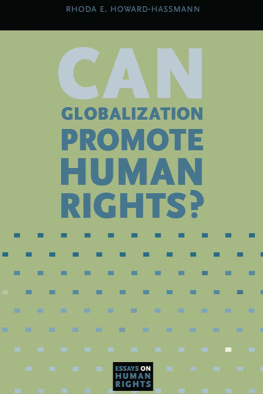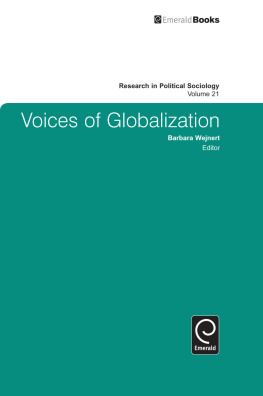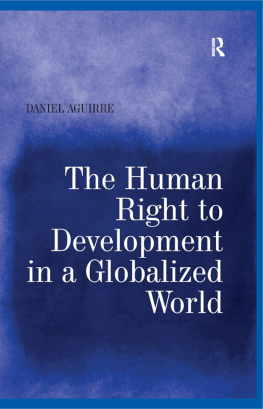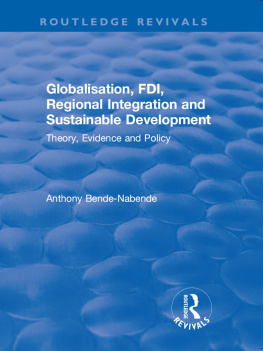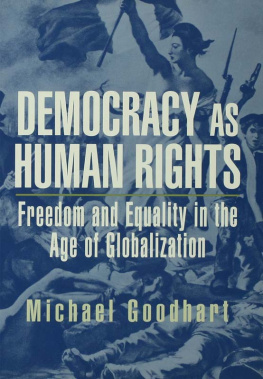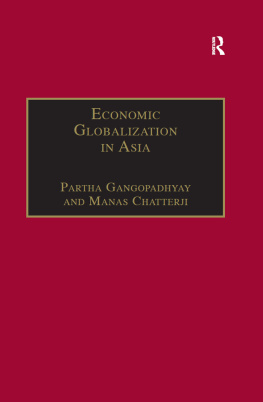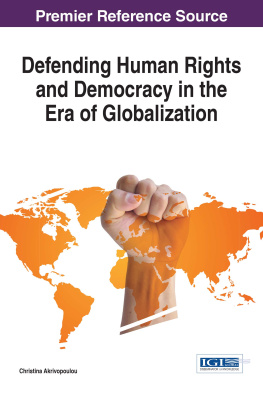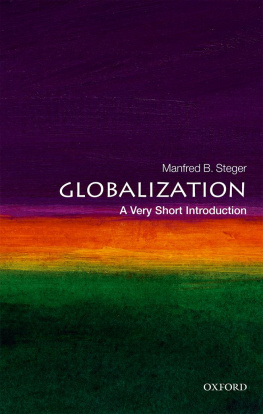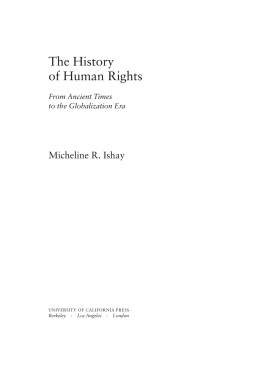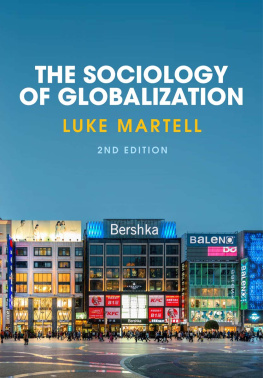Can Globalization Promote Human Rights?
EDITED BY THOMAS CUSHMAN
This series features important new works by leading figures in the interdisciplinary field of human rights. Books in the series present provocative and powerful statements, theories, or views on contemporary issues in human rights. The aim of the series is to provide short, accessible works that will present new and original thinking in crystalline form and in a language accessible to a wide range of scholars, policymakers, students, and general readers. The series will include works by anthropologists, sociologists, philosophers, political scientists, and those working in the more traditional fields of human rights, including practitioners.
Thomas Cushman is Professor of Sociology at Wellesley College. He previously edited a series for The Pennsylvania State University Press titled Post-Communist Cultural Studies, in which a dozen volumes appeared. He is the founding editor of two journals, Human Rights Review and the Journal of Human Rights, and he now serves as Editor-at-Large for the latter. He is a Fellow of the Yale Center for Cultural Sociology.
ALREADY PUBLISHED:
Bryan Turner, Vulnerability and Human Rights (2004)
Keith Tester, Humanitarianism and Modern Culture (2010)
OTHER TITLES FORTHCOMING:
John Rodden, Dialectics, Dogmas, and Dissent: Stories from East
German Victims of Human Rights Abuse (2010)
Daniel Levy and Natan Sznaider, Human Rights and Memory
Nancy Tuana, Global Climate Change and Human Rights
Library of Congress
Cataloging-in-Publication Data
Howard-Hassmann, Rhoda E., 1948
Can globalization promote human rights? /
Rhoda E. Howard-Hassmann.
p. cm. (Essays on human rights)
Includes bibliographical references and index.
Summary: An examination of globalizations effects on human rights, world poverty, and inequality. Describes international human rights law and the international social movement for reform of globalizationProvided by publisher.
ISBN 978-0-271-03739-4 (cloth: alk. paper)
1. Globalization.
2. Human rights and globalization.
3. GlobalizationMoral and ethical aspects.
I. Title. HF1359.H69 2010
323dc22 2009047838
Copyright 2010
The Pennsylvania State University
All rights reserved
Printed in the United States of America
Published by
The Pennsylvania State University Press,
University Park, PA 16802-1003
The Pennsylvania State University Press
is a member of the
Association of American University Presses.
It is the policy of The Pennsylvania State University Press to use acid-free paper. Publications on uncoated stock satisfy the minimum requirements of American National Standard for Information SciencesPermanence of Paper for Printed Library Material, ANSI Z39.481992.
This book is printed on Natures Natural, which contains 50% post-consumer waste.
In memory of my colleague and friend
Katarina Tomasevski, 19532006
United Nations Special Rapporteur on the Right to Education,
19982004
brilliant, beautiful, bold, and brave
extraordinarily generous
and extraordinarily dedicated to human rights
for which she gave her life.
CONTENTS
Many people at Wilfrid Laurier University in Waterloo, Ontario, where I hold the Canada Research Chair in International Human Rights, assisted me during the completion of this book. Sue Horton and Christine Neill of the Department of Economics were extraordinarily generous in helping me make sense of the data in . I worked through several drafts of the manuscript while teaching graduate students from the Department of Political Science, Department of Sociology, Department of Religion and Culture, Masters in International Public Policy, and PhD in Global Governance in two courses in 2008. Jay Allingham, Meghan Bateman, Michael Bittle, Giovanni Congi, Robert Cundari, Jackie DaSilva, Nicole Desmarais, Jacqueline Flatt, Matthew Foster, Sadira Garfinkel, Lyndsay Hockin, Richard Kirkham, Tiffany Kizito, Matthew Overall, Jelena Popovic, Natalie Ravoi, Kirsten Pries, Stephanie Ryan, Leah Sarson, Kris Slater, Samantha Sue Ping, Lindsay Walden, and Craig Wood all contributed useful ideas and comments, while J. Ricardo Tranjan offered trenchant criticisms and led a three-hour discussion of an early version of the manuscript. Anastasi Bakolias, Stefanie Bujnowski, Keith Calow, Gregory Eady, James Gaede, Michael Lisetto-Smith, Matthew Overall, and Rena Patel provided valuable research assistance, responding promptly and cheerfully to my many requests for information.
Wendy Webb, administrative assistant to the chair, once again kept budgets, paychecks, and many other details under control so that I could devote my time to writing. Wendys warmth, efficiency, and loyalty have been integral to all my research for the past six years. I am most grateful to the Canada Research Chairs Program for the position I hold at Laurier, which gave me the resources and time I needed to work on this manuscript, and I am certainly grateful to Wilfrid Laurier University itself.
Michael Freeman of the University of Essex commented thoroughly on an early version of ; Peter Baehr also offered critical feedback on a related work. My beloved friend Grace Stewart generously read the entire manuscript, commenting on it from her dual point of view as a teacher of English grammar and an interested citizen. My friend of forty years standing, Anne Castle, formerly of the World Bank, carefully read and critiqued chapters 1 through 6. Will Coleman, now a colleague in the Balsillie School of International Affairs in Waterloo, Ontario, was there at the beginning, when the idea for the article that eventually became this book germinated at an interdisciplinary conference on globalization and autonomy that he organized at McMaster University in 2002. Anthony Lombardo, my research assistant at the time, was also extremely helpful.
Sandy Thatcher of The Pennsylvania State University Press was extremely supportive throughout the production of this book, as was Tom Cushman, editor of the Presss series Essays on Human Rights. I was pleased and encouraged by the review submitted by my esteemed colleague, Gavin Kitching, and found the other (anonymous) review of the manuscript useful. I am also most grateful to Julie Schoelles for her superb editing.
Parts of this book draw on two earlier articles I wrote on human rights and globalization: The Second Great Transformation: Human Rights Leapfrogging in the Era of Globalization, Human Rights Quarterly 27, no. 1 (2005): 140, and Culture, Human Rights, and the Politics of Resentment in the Era of Globalization, Human Rights Review 6, no. 1 (2004): 526. I am extremely grateful to Bert Lockwood, editor of Human Rights Quarterly, for his interest in The Second Great Transformation and his long-standing regard for my work. Richard Claude, founding editor of Human Rights Quarterly, also encouraged publication of the article. I express my appreciation to Gary Herbert, editor of Human Rights Review, for publishing the second article. I thank both Human Rights Quarterly and Human Rights Review for permission to use material from the two articles in this volume.
Finally, I thank my husband, Peter McCabe, an economist by trade. He was extraordinarily patient with me as I worked through the economic background for this book, but more than that, had I not lived with him for the past thirty-one years I would not have been able to write it at all. His critical comments and insightful observations have influenced all my thinking since the day we met in December 1976.

